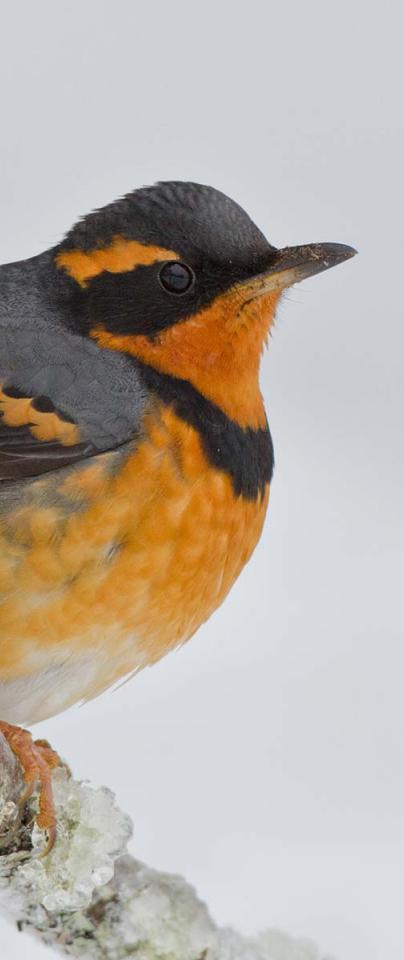My obscure route into science: Graham Etherington
Not everyone has a 'classic' route into a scientific career, proving that it’s never too late to change your career path.
Not everyone has a 'classic' route into a scientific career. At the Earlham Institute, we have talented staff from a range of backgrounds, who prove that it’s never too late to change your career path.
We interview Graham Etherington of our Regulatory and Systems Genomics Group, who fills us in about his journey from the RAF to the Falklands and finally to EI - as well as his love for all things avian.
Definitely. Many scientists leave high school, go on to sixth-form college, then to university and maybe go on to do an MSc or PhD afterwards.
I left school at 16 with two GCSE’s and then joined the Royal Air Force for over 12 years. The RAF provided me with a more settled life and I took advantage of this by re-taking a number of the exams that I’d failed at school and generally bettering myself all round.
I left the RAF at the age of 30, did an Access to Higher Education course and then went on to do a BSc in Biological Sciences. It was during my degree that I really got interested in both evolution and bioinformatics. I went on to pursue these interests by doing a PhD in the evolution of foodborne viruses.
I was in the Falkland Islands, with a gun.
Although my work on foodborne viruses led me to work on crops and pathogens, I’d always really wanted to work on vertebrates, especially wild species. When Prof Di Palma arrived at EI I was presented with this opportunity and jumped at it.
I’d been interested in wildlife ever since I can remember. As a child, money was always quite tight in my household, so when I was presented with a proper pair of binoculars as a 12th birthday present, I couldn’t put them down. Using them to watch the wildlife in a nearby park seemed a natural thing to do and with a bird field guide that I bought with a birthday gift voucher, I started identifying all the birds there.
Not to start with. When I left school there’s no way I ever thought I’d go to university and earn a degree. And if you’d turned around and told me at 16 that one day I’d be ‘Dr Etherington’, I would have just laughed at you and thought you’d got me confused with someone else!
As my scientific career has developed, though, I’ve found that my interest in birds and other natural species has given me an immense amount of knowledge that I can apply to my work. Working in population and conservation genomics brings me into contact with species that I’m familiar with through my hobby.
Varied Thrush – Google it, you’ll see why!


The haunting songs of the Varied Thrush echo through the dense humid forests of the Pacific Northwest. Long minor-key whistles repeated after deliberate pauses, they seem like sounds without a source; only a careful searcher will find the bird itself.
From Audobon website

Robin (grrrr). Robins have a ‘tick-tick’ call, which is very similar to that of a number of Asian species that occur very rarely in the UK. The amount of time I’ve spent chasing tick-tick’s only to find it’s just another Robin …
I spend most of my birding time at my ‘patch’ in Waxham, Norfolk, but if I was to pick one place where I love birding, then I’d have to go for California. Seabirds off Monterey, alpine birds in Yosemite, woodland birds in the Redwoods and desert birds in the Mojave. What a great mix!
There’s often plenty! There’s a good chance that you might possess a host of transferable skills from previous employments that are quite hard to come by in science. These might include man-management and supervisory skills, organisational skills, leadership skills, work ethics, and a whole range of other skills and characters.
Also, if you’ve previously worked in different environments, it’s easier to find common ground with non-scientific staff and converse at different levels without it being forced.
Firstly, it’s never too late. I didn’t start my degree until I was 31, although prepare yourself for the rather patronising comments of “You’re so brave to change careers at such an ‘advanced’ age”.
Next, don’t think you’ll be at a disadvantage because you haven’t done the same as everyone else. In my first-year at university I found that I had to work a bit harder than most other people as I’d only done a one-year part-time course instead of two years of A-level education and found that I needed to do a bit more catching up than most. But with the organisational skills and maturity that I’d gleaned from earlier in life, didn’t find combining the extra work whilst maintaining a sensibly and enjoyable work-life balance any problem.
Finally, if you’re thinking about doing a PhD, you MUST REALLY want to do it (and this applies to anyone). It’s a hard old slog, full of setbacks and disappointments. But when you make that breakthrough and you know that you’re the first person in the world to make that discovery – it’s a great feeling.
That’s science.
Read on for some of Graham's research and insight in our related reading, below!
Here's a few of our favourite resources which should point the way to a career in science.
https://targetcareers.co.uk/career-sectors/science/156-how-do-i-get-into-science